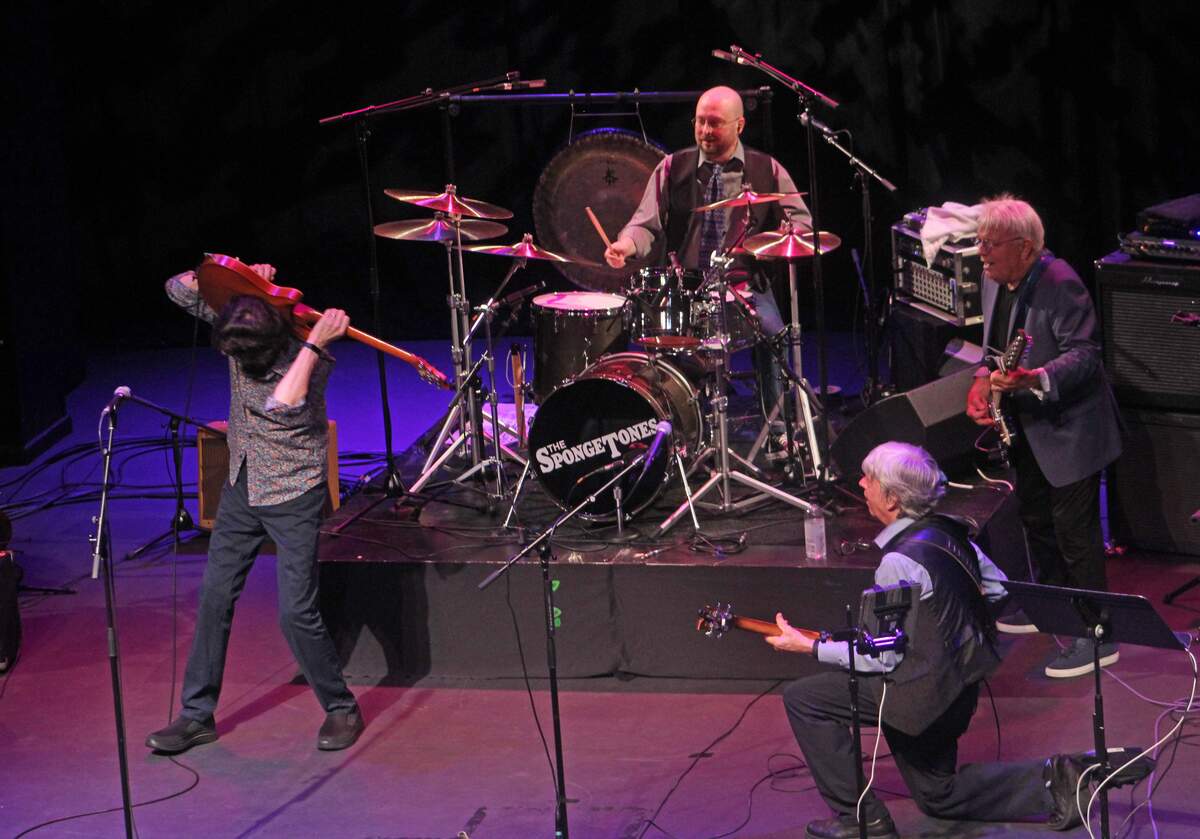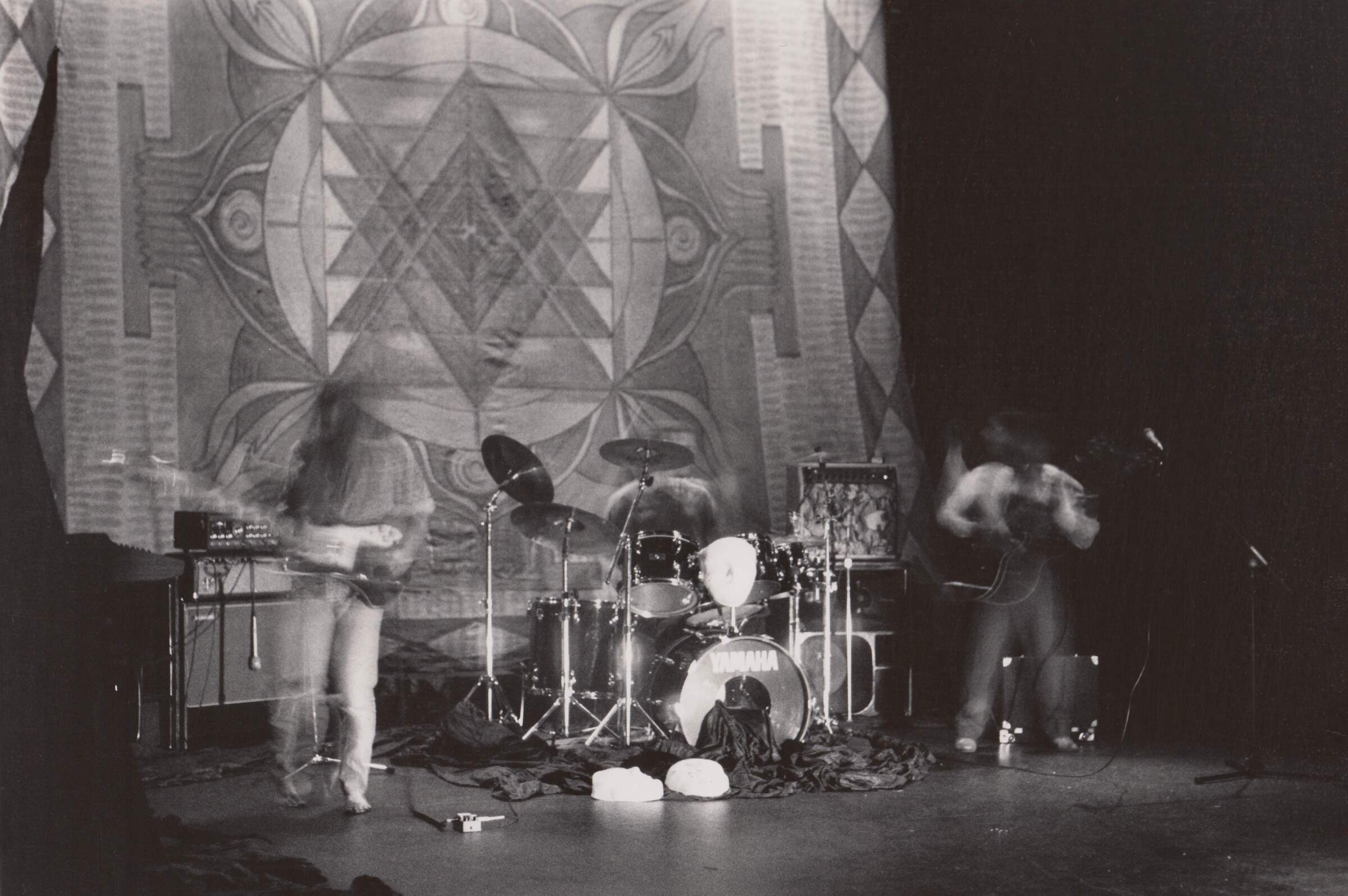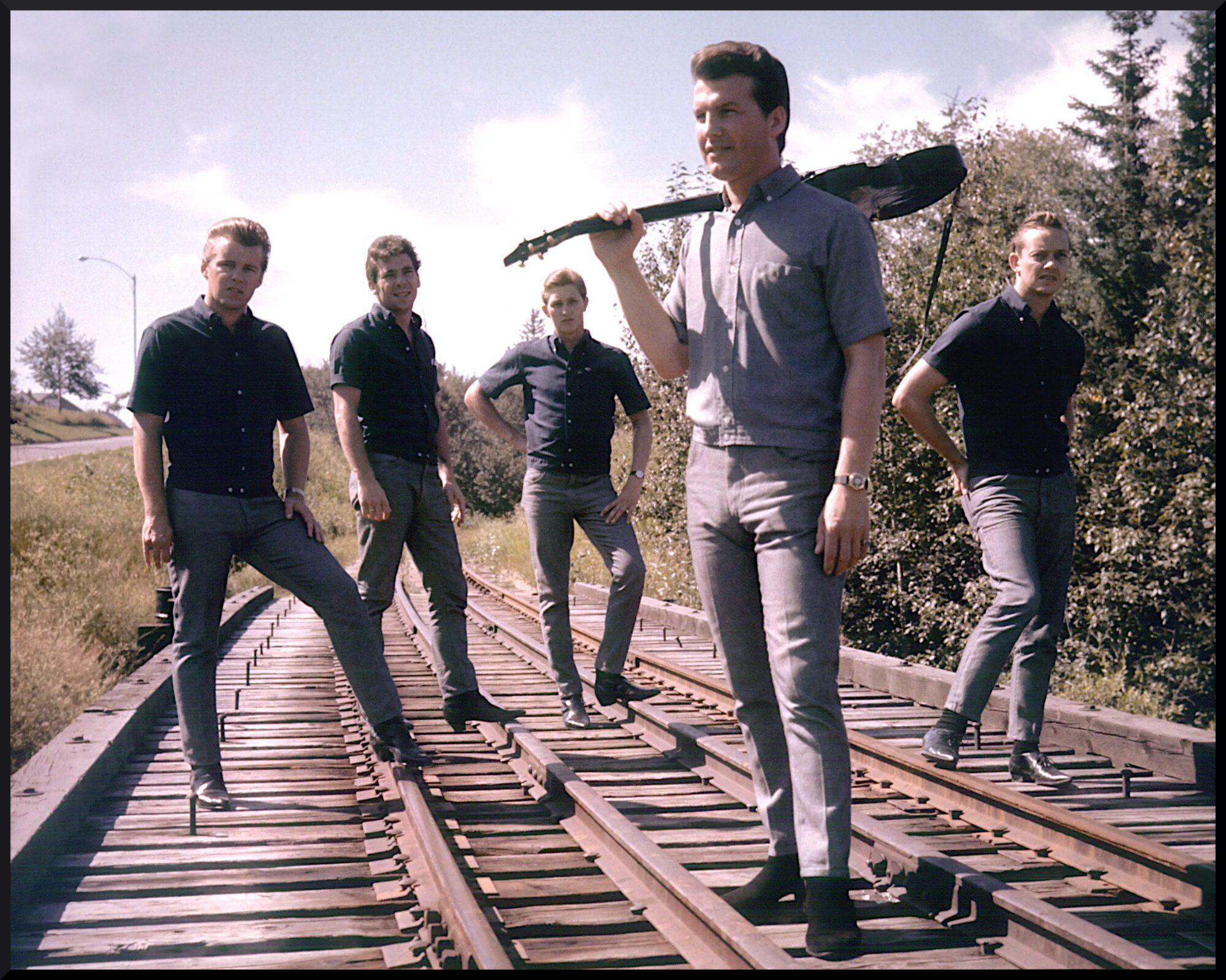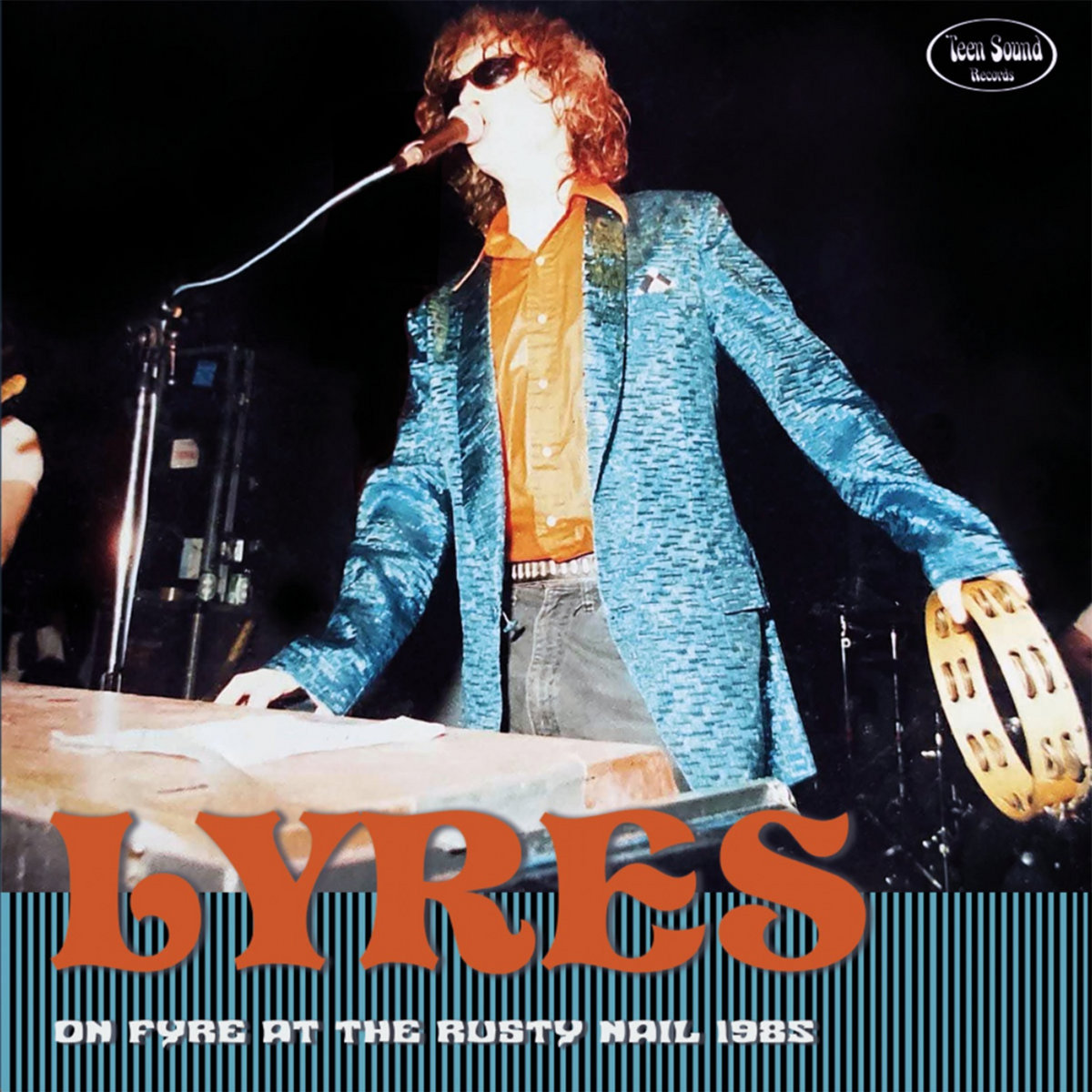The Spongetones: Beats, Rhymes And Rhythms
The Spongetones have always been a band that excelled in versatility. They could play the songs of the 1960s and 70s better than anyone, and they could also be creators of their own original power pop anthems.
They were a band originally put together for a one-show performance, and their music has since spanned more than forty-five years and numerous albums. Hailing from that bastion of Beatledom, Charlotte, North Carolina, the frontline of Steve Stoeckel, Jamie Hoover, and Pat Walters has seen their songs revered all over the world. They were even given a thumbs-up on American Bandstand in 1984.
The band’s new album, ‘The 40th Anniversary Concert…And Beyond,’ is both a celebration of the band’s history and its future. The concert, recorded in Charlotte on August 14, 2021, captures all the energy that made their shows so special. The CD also features three new songs from the band, sounding like a friend from long ago you did not realize how much you had missed until they appeared again in your life.
The album is also a testament to the work of drummer Chris Garges, who joined the band in 2013 and organized and recorded the 40th anniversary show. Since Garges’ passing in 2022, the drums have been manned by Eric Willhelm, who makes his recording debut on these new tunes, with the promise of more songs in the future.
The entire band joins in for a talk about their past, the new album, and what it means to be part of something still enjoyed by so many.

“We always carry on”
This new album, as well as the Spongetones archives, are now available through Big Stir. How did this happen?
Steve Stoeckel: Rex and Christina at Big Stir Records put out a single of mine a few years back. They kept encouraging me to take that, add songs, and make a full-length album. The result was ‘The Power Of And,’ which came out in 2023. Beyond that, the Spongetones had been working on the recording of the 40th anniversary concert at Spirit Square. I approached them about a Spongetones CD and they thought it was a great idea. They put out the concert and three brand new tunes.
Jamie Hoover: We played our show at the Blumenthal on our 40th anniversary (actually 41st, because of Covid-19). Chris Garges set it all up. The sound engineer had separate tracks of the music, such as bass, guitars, drums, vocals, and so on, so I was able to pull them all into my software and make a proper mix of everything. Steve had a relationship with Big Stir and suggested releasing it through them, and they liked the idea.
Talk about the 40th anniversary show and pulling this together through 2020 and 2021.
Stoeckel: Chris Garges was the driving force here. He planned the concert as well as the multitrack recording, which was done by Dan Hodges. It had to be postponed a year because of the pandemic, but we rebooked it.
Hoover: We had several rehearsals at Chris’s studio in Charlotte and really worked on our setlist for the show.
Walters: Chris came up with the idea and ran with it. Without him, it would never have happened. We are all very grateful to him.
What are your favorite memories about the 40th anniversary show?
Stoeckel: Seeing so many old friends and fans from long ago, some who had traveled long distances, was amazing. We felt the love coming from the crowd. We had rehearsed and were all four in sync.
Hoover: Seeing my three dear friends and myself on stage! It was a lot of fun. I love these guys sincerely. Playing with them has always been a joy. We all needed and wanted to do this show in a huge way. I am so glad we got to.
Walters: We first played at Spirit Square in 1981 on a show with our friends the Federal Bureau of Rock and Roll, with brothers Lenny and Mike Federal. Playing our show there forty years later was quite the nostalgia trip. Seeing so many friends, lifelong supporters, and family in the audience was like coming home. It was a great way to present our legacy.
Jamie, Steve, Pat, and Eric, you all had remarkable résumés of bands before the Spongetones joined forces. I’d love to have you each talk about those groups, and how that led you to the Spongetones.
Stoeckel: I played in various top 40 bands starting in 1970, and on Eros, a ten-piece horn band that evolved into a six-piece rock band. Sassafras, a country rock band, and others followed. Pat called me in 1978 saying a few folks were putting together a band to play Beatles and other British Invasion music for one night only. It took off from there.
Hoover: None of those bands were around for me at that time, except the Happy Eggs, another dear bunch of friends. I feel so lucky to have been blessed with all of these wonderful partners in crime.
Alan Kaufman and I had done a session together, and we both decided to go over to the Double Door Inn and see them play. I wasn’t in the band yet, but on their break Pat came over to me and Alan and said their other guitarist Keith Brooks was leaving the band. Pat told me, “Your name came up to me,” and then said, “So, you’re in!” One of the best days of my life.
Walters: In my early groups, the Barons and the Paragons, we were learning to play and sing but also learning to play as bands. We were learning how to deconstruct songs, and through that we learned how to write and perform our own. I gained a lot of valuable experience while recording the album Jeremiah in 1970. It was my friend David Brown’s project and I learned a good deal about songwriting and music from him. On a side note, Denny Seiwell, a session drummer in New York City at the time, was the drummer on most of the tracks. A few months later he was recording with Paul McCartney and became Wings’ first drummer.
Willhelm: Somewhere around 2014 my path intersected with that of Steve and Pat. I was, and still am, playing in a cover band, the Coconut Groove Band. Steve and his wife would come to see us play, and Steve would sit in with us for a few songs here and there, igniting a strong kinship. Around this time, CGB were preparing to play a benefit concert and asked Steve and Pat to join us for a few songs. We billed ourselves as the GrooveTones. Meanwhile, I was already friends with then-Spongetones drummer Chris Garges, who would sub on drums for CGB when I wasn’t available. When Chris’ illness started to become more debilitating, I was asked to serve as a standby drummer in case Chris was ever unable to play. But he was a trooper to the very end, and managed to play every show. He was even kind enough to let me sit in for a few songs at one of his Spongetones shows as a form of thanks for having learned their repertoire. I would give the world to have Chris with us today, expertly carrying out his drum duties with the band. But since fate rolled as it did, I am humbled and honored to not only carry on Chris’ work for him, but also to play for a band I have admired since I was fourteen.
While the band first made its name covering artists from the 1960s and 70s, you have now released a multitude of original albums and EPs. What sparked you to write and record your own songs?
Stoeckel: Jamie Hoover drove that. He had written and recorded songs and knew we had to do more than Beatles covers. He was right, of course.
Hoover: I was working in a recording studio at the time, Davis Sound. I was already recording things, both for other people and for myself. I said we ought to write some songs in the style of all the Mersey Beat bands and see what comes up. Pat wrote two, which we recorded at Lamon Studios in Mint Hill, and they came out great. That was our first single.
Walters: When I wrote ‘Better Take It Easy’ and ‘You’re the One,’ I wanted them to sound Beatlesque without being parodies. The songs had to be well-constructed, and the recordings needed production that sounded like something from 1963 to 1965. I wanted to capture some of that energy. We were all in sync on that. Jamie and Mark Williams nailed it with the production. This was in the early 80s, and some people didn’t get it, but those who did loved it.
It had been a long time since the Spongetones had recorded and released new songs. How did this happen?
Stoeckel: After Big Stir Records signed us, we just went to work.
Talk about the three new songs.
Stoeckel: “Lulu’s in Love” is by me. I love girls’ names for inspiration, and “Lulu” was unusual. She began as a sweet love interest but morphed into a real man-eater, breaking hearts right and left. That made it more interesting.
Hoover: “Lulu,” Steve’s contribution, is a great pop tune, perfect for us.
‘Janie’ was written by my friend Michael Slawter and me. Michael sent me a demo with “la la la” lyrics and said, “Help me, Jamie.” I loved it and finished it up right away. I decided “Help me Jamie” needed to say “Help me Janie,” which I wrote about a guy trying to get to a girl through her girlfriend. Evil, I know. That’s me singing lead.
‘Honest Work,’ by Pat and me, was really just channeling from real life, trying to make a living from music. Pat sings the lead on that.
Walters: Jamie and I wrote “Honest Work” a while back. I had a tune and maybe the title. We based the new recording on my demo but vastly improved it. Jamie wrote some great lyrics, as always, and contributed melodic ideas.
Do you have plans for more new songs?
Stoeckel: Oh yes. We have plenty already in various states of completion.
Hoover: Always.
Walters: Yes, indeed.
This will be the hardest question for me to write. Talk about Chris Garges, and his influence on the 40th anniversary show and the band’s history.
Stoeckel: Chris was a soldier that night. He was dealing with a lot of medical stuff, but you would not have known it. He pushed us through the whole show with amazing energy. This would be the next-to-last gig he played with us, though none of us knew.
Hoover: He made this show happen. He gave us a new and younger perspective on what we do. He was completely a George Martin lover and was devoted to all the cool, old recording gear. His studio was a museum. He really understood us, and what we were trying to do. He was a wonderful drummer to play with.
Walters: I loved Chris—his playing, sense of humor, work ethic, so many things. “Fix it in pre” was one of his slogans. He wanted things to be right. This whole show was his legacy as well as ours. He would have gotten so much pleasure from the album.
Eric Willhelm not only brings drums to the band, but also a fourth singing voice. Talk about having that in the band now.
Stoeckel: It’s wonderful, not just having a fourth singer, and a good one, but also having a great drummer who listens completely to the vocals as well as the instruments. It changes things for the better.
Hoover: He brings another new and younger contingent to the band. He is so great, has no weird attitudes, is funny as hell, and is extremely talented. He comes from an entire family of brilliant drummers.
Walters: Eric is a great drummer and vocalist and an all-around great guy. He gets us. We’re lucky to have him.
Willhelm: Gosh, am I blushing yet? These fellas are too kind. But seriously, as mentioned earlier, I am humbled to be in this band. I recently mentioned to someone that, back when I was fourteen, if some time traveler had popped into my room while I was listening to “Beat Music” at full volume, and said to me, “Son, in the year 2022 you will be a member of this band,” I don’t know what I would have thought. But here we are, and I am glad to be here. And who knows. Maybe, just maybe, in future endeavors, I will have a “singing Ringo” moment or two up my sleeve.
I have recently been listening to a recording of the band from 1981. What do you think are the things or songs that tie together the band from then to now?
Stoeckel: The songwriting, the singing, and Jamie’s producing. These are what set us apart from the beginning. Other bands had good musicians too, but those three things are why we are still talking about the Spongetones.
Hoover: We didn’t repeat ourselves. We tried to keep it fresh, while still remaining true to our history and love of music of all kinds.
Walters: Friendship and love of the music.
Did you ever imagine the Spongetones still making music forty-five years into its history?
Stoeckel: I had no doubt.
Hoover: Hell, I could not imagine myself making it that long, let alone a band. It has been a great marriage. I still love them all.
Walters: Of course.
Answer this question. What are the Spongetones?
Stoeckel: The Spongetones are a band that ties together the music they grew up with in the 60s and manage to move forward, wearing their influences proudly while finding new ways to make good pop music.
Walters: The sound of eternal youth with a touch of maturity.
Willhelm: The band that showed me how local talent could produce amazing records right in my hometown. No small feat in 1980.
Hoover: Pat, Steve, Jamie, and now Eric. We always carry on.
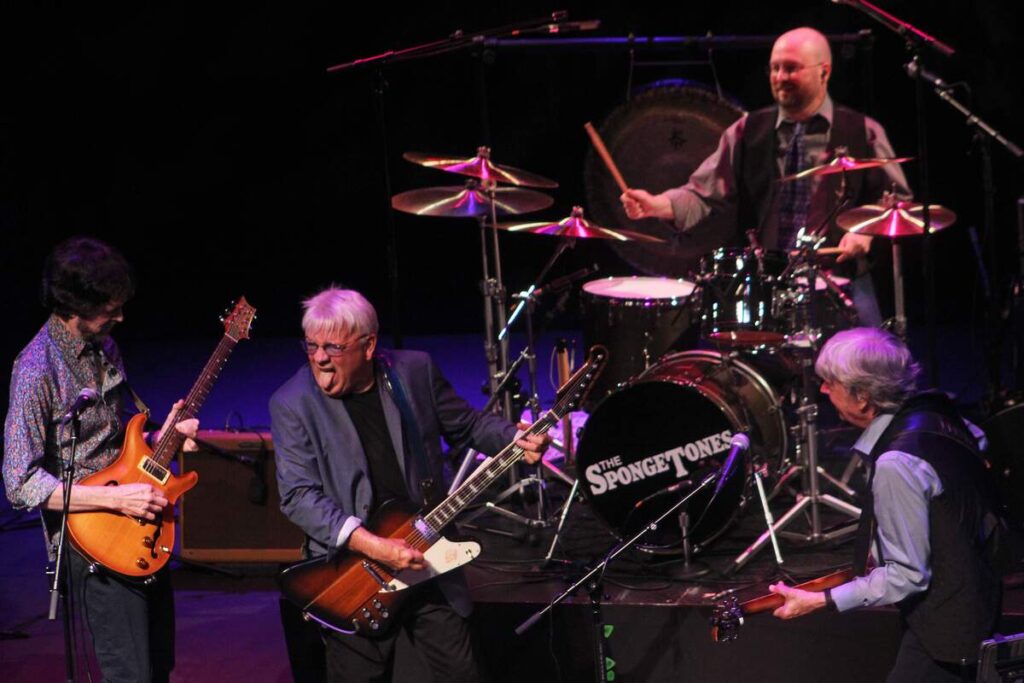
Bonus question. What was it like to have your song rated and approved by American Bandstand?
Stoeckel: Heartstopping.
Hoover: Cool, but nerve-racking. It was a long two minutes and ten seconds on the first one. Those kids looked like they were thinking, “What is this?” Still, I was beaming with pride.
Walters: Just wow.
Daniel Coston
The Spongetones Official Website / Facebook / Instagram
Big Stir Records Official Website / Facebook / Instagram / X / Bandcamp / YouTube

